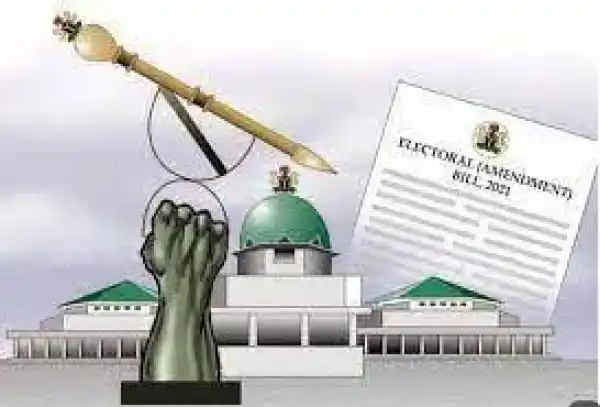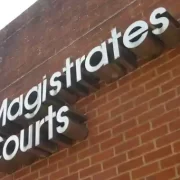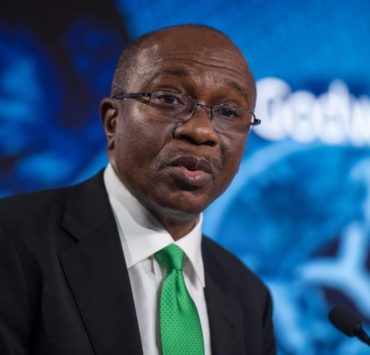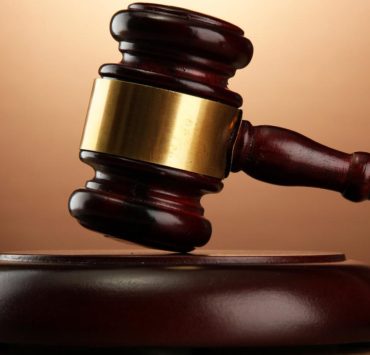Electoral (Amendment) Act, 2022: The Big Hurdle Before Federal High Court Judges

Lawyard is a legal media and services platform that provides…
The Chief Judge (CJ) of the Federal High Court (FHC), Justice John Tsoho, recently, said no fewer than 556 pre-election matters were pending before the court as the country prepared for the 2023 general elections.
According to Justice Tsoho, a total of 1,838 pre-election cases were filed in the court, out of which 1,285 cases have been disposed of, leaving a total of 556 cases pending.
It is a common knowledge that the Independent National Electoral Commission (INEC) had scheduled the Presidential and National Assembly elections for February 25 while the Governorship and the State Assembly polls would be conducted on March 11.
The Electoral Act Amendment Bill, 2022, was signed into law by President Muhammadu Buhari on February 25, 2022 at the Council Chamber of the Presidential Villa, Abuja.
At the event which was witnessed by the Vice President, Prof. Yemi Osinbajo; President of the Senate, Ahmed Lawan, and Speaker of the House of Representatives, Femi Gbajabiamila, President Buhari said in line with established tradition, he received inputs from relevant ministries, departments and agencies of government after careful and thorough reviews of the Bill and its implications to democratic processes in Nigeria.
He said, “It is gratifying to note that the current Bill comes with a great deal of improvement from the previous Electoral Bill 2021.
“There are salient and praiseworthy provisions that could positively revolutionise elections in Nigeria through the introduction of new technological innovations.”
“These innovations would guarantee the constitutional rights of citizens to vote and to do so effectively.”
President Buhari said the Bill would also improve and engender clarity, effectiveness and transparency of the election process, as well as reduce to the barest minimum incidences of acrimony arising from dissatisfied candidates and political parties.
According to him, these commendable efforts are in line with our policy to bequeath posterity and landmark legal framework that paves the way for credible and sound electoral process that we would all be proud of.
Although President Buhari expressed reservations about Section 84(12) of the Bill, which he said is in conflict with Section 40 and 42 of the 1999 Constitution (as amended) and sought its amendment, he, however, signed it into law.
The Electoral (Amendment) Act, 2022, since that day became operational in Nigeria.
The president’s action drew commendations from civil society organisations, political parties, Nigerians, and members of international community.
But besides President Buhari’s observation on the Electoral (Amendment) Act, 2022, the Federal High Court (FHC) CJ, Justice Tsoho, recently too, expressed his reservations about some provisions in the Act.
The chief judge had made this known on Dec. 12, 2022, at a special court session to mark the commencement of the 2022/2023 Legal Year of the FHC in Abuja.
According to Tsoho, by virtue of Sections 29(5) and 84(14) of the Act, exclusive jurisdiction is foisted on the FHC in the hearing and determination of pre-election complaints in the country.
For the CJ, Sections 29(5) and 84(14) of the Electoral (Amendment) Act, 2022 had imposed additional jurisdiction on FHC judges.
“Linked to that jurisdiction is Section 285 (10) of the Constitution of the Federal Republic of Nigeria (as amended), which provides that such pre-election cases must be concluded within 180 days from the date of filing of the suit,” he said.
The CJ said the development was in addition to “the judges’ existing ‘high-volume’ dockets that present enormous challenges.”
Tsoho, who said that no support whatsoever was provided to address the increased responsibility, said FHC was not consulted by the National Assembly in the enactment of the Act.
His words: “It is necessary to place on record that the Electoral (Amendment) Act, 2022 was enacted without any consultation with the court.
“This weighed heavily on the operations of the court.”
He said in response to this enormous time-bound responsibility, he constituted a Special Task Force of Judges for the swift disposal of pre-election matters, giving them four weeks to dispensed with these cases.
“The judges drafted into the task force were saddled with the mandate of completing all pre-election cases before they lapsed.
“In some instances, judges were drafted from their substantive bases to help in other judicial divisions that had a glut of these cases,” he said.
He commended the judges drafted into the special assignment for their resilience and sheer determination to deliver justice within time frame.
Justice Tsoho thanked the Chief Justice of Nigeria, Justice Olukayode Ariwoola, for approving an emergency fund to support the court in the assignment.
Tsoho though admitted that the new electoral law, which was enacted without their consultation, had disrupted the operation of the court, he, however, stressed that this would not alter their core fundamental values as a court: to rise to challenges and tackling them head on.
“This underpins our resolve to soar in the face of adversity,” he had said.
The CJ said with 76 judges across all its divisions nationwide, the court was understaffed and efforts were ongoing to recruit more judges.
The President of the Nigerian Bar Association (NBA), Yakubu Maikyau, SAN, also said the sections which conferred jurisdiction exclusively on the FHC in pre-election matters had, no doubt, come with a lot of pressure on the already overloaded dockets of the judges.
“By the amendment to the Electoral Act, the lot has fallen on Your Lordships to interpret and apply the innovative and novel provisions of the Electoral Act 2022.
“I am aware that already over 1000 pre-election matters have been filed before this court across the country which necessitated the establishment of a special task force of judges to swiftly hear and determine all pre-election cases before it.
“It was reported that judges who are members of the task force will suspend all regular cases in their respective courts due to the urgency of the electoral cases which are time-bound,” he said.
Maikyau, who acknowledged the time constraints in dealing with pre-election matters by virtue of the limits set by the 1999 Constitution (as
amended), said the suspension of the hearing of all regular cases before the judges who constitute the task force was of serious concern to the Bar.
According to him, for a court that deals with cases arising from serious commercial transactions which impact one way or the other on the economy of the nation, the suspension of the hearing of such matters comes with grave consequences on the economy and affects the confidence of investors.
The NBA president, therefore, faulted the decision of the National Assembly to limit the hearing and determination of pre-election cases to FHC “without regard for its infrastructural and manpower deficit.”
He said it was disheartening that cases that were earlier done by over 700 judges across the country had been limited to about 76 judges of FHC based on the new Electoral Act.
“To saddle this court with the responsibility hitherto undertaken by the Federal High Court, all State High Courts and the High Court of the Federal Capital Territory, Abuja, using the same number of personnel and infrastructure is to overstretch the court unnecessarily,” he had said.
Maikyau, who said that the development would take a great toll on the health of the FHC judges “who are at the moment poorly renumerated,” called on the legislature to reconsider an amendment to the Electoral Act, 2022.
He, therefore, advised the Federal Government to establish a special court that would deal mainly with electoral and other related matters.
He said the court should be of coordinate jurisdiction with the FHC, State High Court and High Court of the FCT.
Corroborating Maikyau’s submission, the Body of Senior Advocates of Nigeria (BOSAN) also called for the establishment of National Constitutional Court of Nigeria.
Chief Adegboyega Awomolo, SAN, who spoke on BOSAN’s behalf, said the court would handle all constitutional, political and election matters.
According to Awomolo, the Legal Year 2022/2023 is perhaps another one that has thrown up challenges in the country’s constitutional democratic struggle for all Nigerians.
He said since June 2022 when INEC opened the gate to activate political activities towards the general elections scheduled for February and March, the court had been under a very severe pressure and the judges and the entire administrative and court registrars had been extremely stretched.
“We are aware many of the judges of this court had to sacrifice their vacations, scheduled medical appointments and promised holidays with their families.
“We pray that your sacrifices be rewarded by God, who sees all things,” he had said.
But the Executive Director, Civil Society Legislative Advocacy Centre (CISLAC), Auwal Musa-Rafsanjani, said the idea of the new law was to ensure a reform of the electoral laws.
According to him, it was obvious that the new law was enacted to correct the challenges of the previous Act.
He said that was why the Act took pre-election matters away from the purview of the States’ High Courts because of allegations that some of these courts are easily influenced by their host state governments.
Musa-Rafsanjani, who spoke to NAN in a telephone chat, said besides, the courts were faced with delay in justice delivery.
“Some of the judgments they delivered come almost at the end of the tenure of the supposed loser or winner of the election.
“This is not also good because the person must have illegally enjoyed all the privileges as an elected person whether as governor, senator, etc,” he said.
He, therefore, agreed that to correct cases of conflicting judgments by one court or the other, it was good a particular court is given that responsibility.
“Otherwise, if we insist on going back to the statue quo, it will not augur well.
“Because if we want to continue in the way and manner some judges and courts are pronouncing judgments on elections, it will negatively affect the delivery of justice in Nigeria,” he said.
Musa-Rafsanjani, however, suggested that more competent and qualified judges should be recruited to ease the workload of FHC.
He also commended Justice Tsoho for setting up task force of judges to handle the pre-election cases.
He said this would go a long way to ensuring consistency and some levels of sanity in the way and manner judgements are giving.
“If there are tangible challenges, we can after the elections, begin to do electoral amendment to address some of the gaps we notice
“Therefore we must ensure that we do not frustrate 2023 elections. We must carry out these elections so that all those gaps that we noted can be addressed by the new assembly,” he said.
The Chief Justice of Nigeria (CJN), Justice Olukayode Ariwoola, who said that the problems facing the court were surmountable, said he had no doubt that the judges were equal to the task.
The Attorney-General of the Federation (AGF) and Minister of Justice, Abubakar Malami, SAN, admitted that the development had evidently taken a toll on the court.
“It was gratifying to note that the leadership of the court had shown commitment and determination to manage the situation optimally through the issuance of the Federal High Court Pre-Election Practice Directions 2022 and the constitution of a special task force of Hon. Judges to speedily hear and determine all pre-election before the FHC.
“I sincerely appreciate the peculiar constraints and challenges which our judges face in delivering these mandates, especially with regards to lack of basic resources to facilitate optimal performance and improved renumeration regime.
“We cannot but appreciate the distinguished judges for their sacrifices and tireless efforts with regards to the administration of justice in Nigeria,” Malami had said.
He said the new electoral law was aimed at advancing the course of electoral jurisprudence and strengthening democratic practices, especially in entrancing internal party democracy.
The question is, with few weeks to the general elections, will the FHC judges do justice to the pending pre-election matters staring them in the face?
Like the late famous reggae musician, Bob Marley, sang, “Only time will tell.”
Lawyard is a legal media and services platform that provides enlightenment and access to legal services to members of the public (individuals and businesses) while also availing lawyers of needed information on new trends and resources in various areas of practice.













